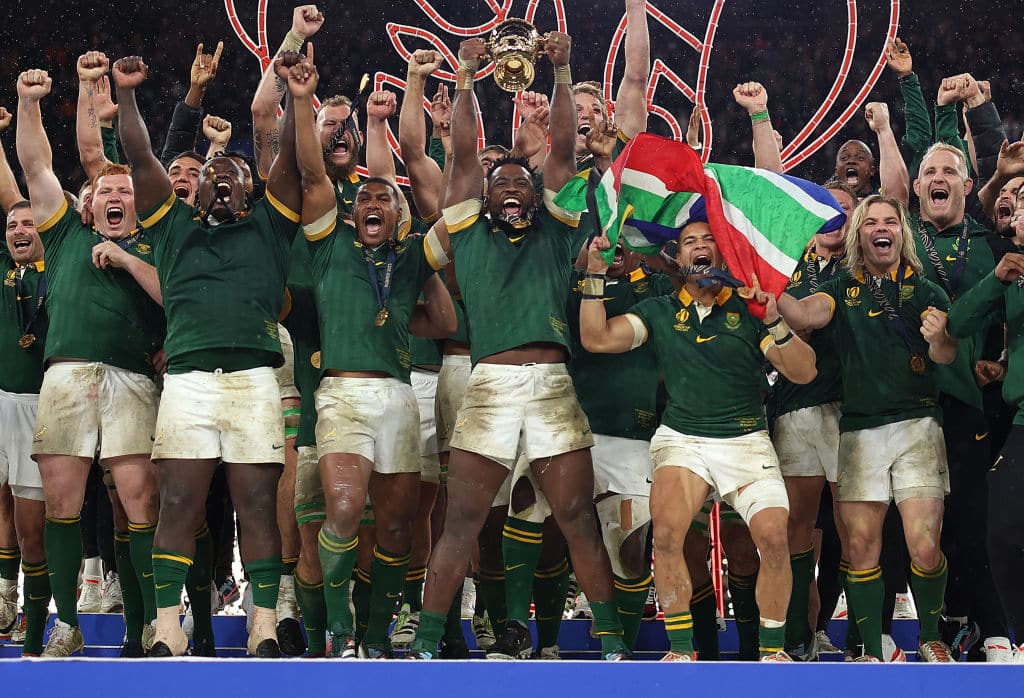Picture Credit:GettyImages
In sports, victories often extend beyond stadiums, igniting unparalleled passion and national pride.
Following the Springboks’ recent historic triumph at the 2023 Rugby World Cup in France, South Africa was ablaze with pride, hope, and unity. The entire nation’s enthusiasm was on full display as South Africans from all walks of life rallied behind the Springboks. Fridays became synonymous with #BokFridays, with locals proudly wearing the national colors, demonstrating an overwhelming show of patriotism and unity.
This fervor for rugby, combined with South Africa’s breathtaking natural beauty, rich culture, warm hospitality, facilities, attractions, and a track record of successfully hosting major sporting events, firmly positions the country as a top sports tourism destination.
In recent years, South Africa has solidified its reputation as a premier sports tourism destination by hosting some of the world’s most prestigious sporting spectacles. These include iconic events such as the 1995 Rugby World Cup, the historic 2010 FIFA World Cup – the only edition held on African soil, and the 2003 Cricket World Cup. Most recently, South Africa proudly hosted the World Table Tennis Championships Finals in May and the Netball World Cup in July and August.
Sports tourism plays a pivotal role in driving economic development in South Africa, contributing significantly to the country’s economy and fostering business development. Major sporting events attract a surge of tourists, leading to increased spending on accommodation, transportation, dining, and local attractions. This influx of visitors not only boosts revenue for various sectors but also creates employment opportunities, particularly in the hospitality and service industries.
Additionally, the exposure generated by hosting prominent sports events enhances South Africa’s global image, attracting foreign investments and partnerships. The infrastructure improvements necessitated by hosting such events, from upgraded stadiums to transportation networks, leave a lasting legacy that benefits local communities and businesses even after the event concludes. Overall, sports tourism emerges as a catalyst for economic growth, promoting entrepreneurship and catalysing business expansion in South Africa.
Prior to Springboks’ Rugby World Cup victory, South African Tourism (SA Tourism) had strategically shifted its focus to explore valuable partnerships and marketing opportunities within the realm of rugby and sports. This culminated in the entity announcing Springbok captain Siya Kolisi as its Global Brand Advocate. The nations enthusiasm for rugby and the South African national team’s victory offers a unique opportunity to harness this momentum for tourism.
According to South African Tourism’s Departure Survey, sports tourism to South Africa has been a consistent mover of people. In 2010, South Africa welcomed 7.9 million tourists and more than 348 000 of those people were traveling primarily for sport chiefly driven by the 2010 FIFA World Cup, which was hosted in South Africa. The year before, almost 128 000 sports tourists arrived in South Africa primarily to attend the 2009 FIFA Confederations Cup. Sport tourism has continued to positively contribute to our arrivals.
In 2019 (pre-pandemic), South Africa received a total of 10.2 million arrivals of which 53 640 were tourists traveling primarily either to attend or participate in a sporting event. In 2023 for the first six months, we saw more than 29 000 people travelling to South Africa for the same reasons contributing R0.6 billion to the country’s economy.
Domestically, sports tourism can ignite regional development, drive local economies, and instill a sense of shared national identity. The Comrades Marathon Association (CMA) estimated that the 2023 Comrades Marathon’s economic impact on Kwa Zulu-Natal alone was R550 million.
The synergy between sports and tourism is undeniable. According to a 2022-2023 report from Future Markets Insights, the global sports tourism market, including rugby, golf, and other sports, is projected to reach an impressive valuation of US$ 40.4 billion by the end of 2033. Factors driving this growth include the increasing number of international and domestic tournaments, significant investments in sports infrastructure, and a rise in both professional and amateur sports players.
With the country setting its eyes on hosting the 2027 FIFA Women’s World Cup, South Africa is poised to harness the power of sports to fuel tourism, showcasing the nation’s beauty, culture, and hospitality to the world.
Article By: Bronwen Auret: Acting Chief Marketing Officer – South African Tourism







